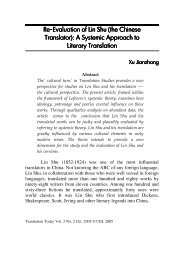Drama Translation: Principles and Strategies Drama Translation ...
Drama Translation: Principles and Strategies Drama Translation ...
Drama Translation: Principles and Strategies Drama Translation ...
You also want an ePaper? Increase the reach of your titles
YUMPU automatically turns print PDFs into web optimized ePapers that Google loves.
62 <strong>Drama</strong> <strong>Translation</strong>: <strong>Principles</strong> <strong>and</strong> <strong>Strategies</strong>for an African readership/audience there is a clear indication of thefact that the translated drama is not uprooted <strong>and</strong> placed in anentirely new cultural context but rather in a more or less “same”cultural context. In effect, the primary target consumers of thetranslations are most often African. It can thus be posited that ratherthan being target-text oriented, translated African drama, <strong>and</strong> indeedAfrican literature in general, is essentially source-text oriented.Other proponents of the target text/target culture <strong>and</strong> receptionorientedapproach in drama translation include Brisset (1990),Déprats (1990), Bassnett (1991), Lefevere (1992) <strong>and</strong> Laliberté(1995).The decision either to “uproot” the play from its originalcultural context or to leave it “untouched” definitely clearly tells onthe compatibility <strong>and</strong> integration of the play in the receiving culture.Consequently, it can be asserted without fear of contradiction thatthe compatibility <strong>and</strong> integration of translated plays in the receivingculture are at the heart of considerations with regard to the dramatranslation principles <strong>and</strong> strategies outlined.<strong>Drama</strong> translation practitioners as well as scholars have allalong been preoccupied with the fate of the translated drama text inthe receiving culture, in other words, by its compatibility <strong>and</strong>integration in the receiving culture. This is clearly evident in thevarious manipulations to which the translated text is subjected astestified by the abundant terminology characterizing suchmanipulation: ‘adaptation’ ‘acculturation’, ‘rewriting’, ‘version’‘transplanting’, ‘naturalizing’, ‘neutralizing’, ‘recreation’,‘transposition’, ‘re-appropriation’, ‘assimilation’, ‘domestication’etc.Scholars (cf. Aaltonen 2000:53-54) think that considerationsof the compatibility <strong>and</strong> integration of translated drama in thereceiving culture play a crucial role in the choice of the text to betranslated <strong>and</strong> the translation strategies used. Concerning the choice
















